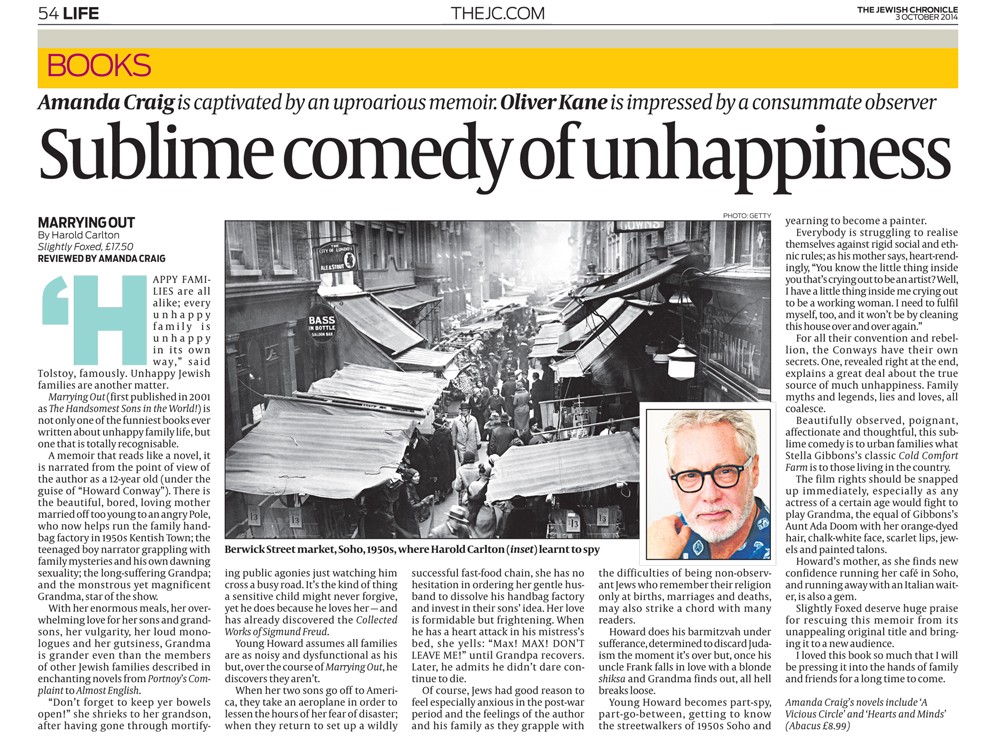“Happy families are all alike; every unhappy family is unhappy in its own way,” said Tolstoy, famously. Unhappy Jewish families are another matter. Marrying Out (first published in 2001 as The Handsomest Sons in the World!) is not only one of the funniest books ever written about unhappy family life, but one that is totally recognisable.
A memoir that reads like a novel, it is narrated from the point of view of the author as a 12-year old (under the guise of “Howard Conway”). There is the beautiful, bored, loving mother married off too young to an angry pole, who now helps run the family handbag factory in 1950s Kentish Town; the teenaged boy narrator grappling with family mysteries and his own dawning sexuality; the long-suffering Grandpa; and the monstrous yet magnificent Grandma, star of the show.
With her enormous meals, her overwhelming love for her sons and grandsons, her vulgarity, her loud monologues and her gutsiness, Grandma is grander even than the members of other Jewish families described in enchanting novels from Portnoy’s Complaint to Almost English.
“Don’t forget to keep yer bowels open!” she shrieks to her grandson, after having gone through mortifying public agonies just watching him cross a busy road. It’s the kind of thing a sensitive child might never forgive, yet he does because he loves her — and has already discovered the Collected Works of Sigmund Freud.
Young Howard assumes all families are as noisy and dysfunctional as his but, over the course of Marrying Out, he discovers they aren’t. When her two sons go off to America, they take an aeroplane in order to lessen the hours of her fear of disaster; when they return to set up a wildly successful fast-food chain, she has no hesitation in ordering her gentle husband to dissolve his handbag factory and invest in their sons’ idea. Her love is formidable but frightening. When he has a heart attack in his mistress’s bed, she yells: “Max! MAX! DON’T LEAVE ME!” until Grandpa recovers. Later, he admits he didn’t dare continue to die.
Of course, Jews had good reason to feel especially anxious in the post-war period and the feelings of the author and his family as they grapple with the difficulties of being non-observant Jews who remember their religion only at births, marriages and deaths, may also strike a chord with many readers.
Howard does his barmitzvah under sufferance, determined to discard Judaism the moment it’s over but, once his uncle Frank falls in love with a blonde shiksa and Grandma finds out, all hell breaks loose.
Young Howard becomes part-spy, part-go-between, getting to know the streetwalkers of 1950s Soho and yearning to become a painter. Everybody is struggling to realise themselves against rigid social and ethnic rules; as his mother says, heart-rendingly,“You know the little thing inside you that’s crying out to be an artist? Well, I have a little thing inside me crying out to be a working woman. I need to fulfil myself, too, and it won’t be by cleaning this house over and over again.”
For all their convention and rebellion, the Conways have their own secrets. One, revealed right at the end, explains a great deal about the true source of much unhappiness. Family myths and legends, lies and loves, all coalesce.
Beautifully observed, poignant, affectionate and thoughtful, this sublime comedy is to urban families what Stella Gibbons’s classic Cold Comfort Farm is to those living in the country.
The film rights should be snapped up immediately, especially as any actress of a certain age would fight to play Grandma, the equal of Gibbons’s Aunt Ada Doom with her orange-dyed hair, chalk-white face, scarlet lips, jewels and painted talons. Howard’s mother, as she finds new confidence running her café in Soho, and running away with an Italian waiter, is also a gem.
Slightly Foxed deserve huge praise for rescuing this memoir from its unappealing original title and bringing it to a new audience. I loved this book so much that I will be pressing it into the hands of family and friends for a long time to come.





